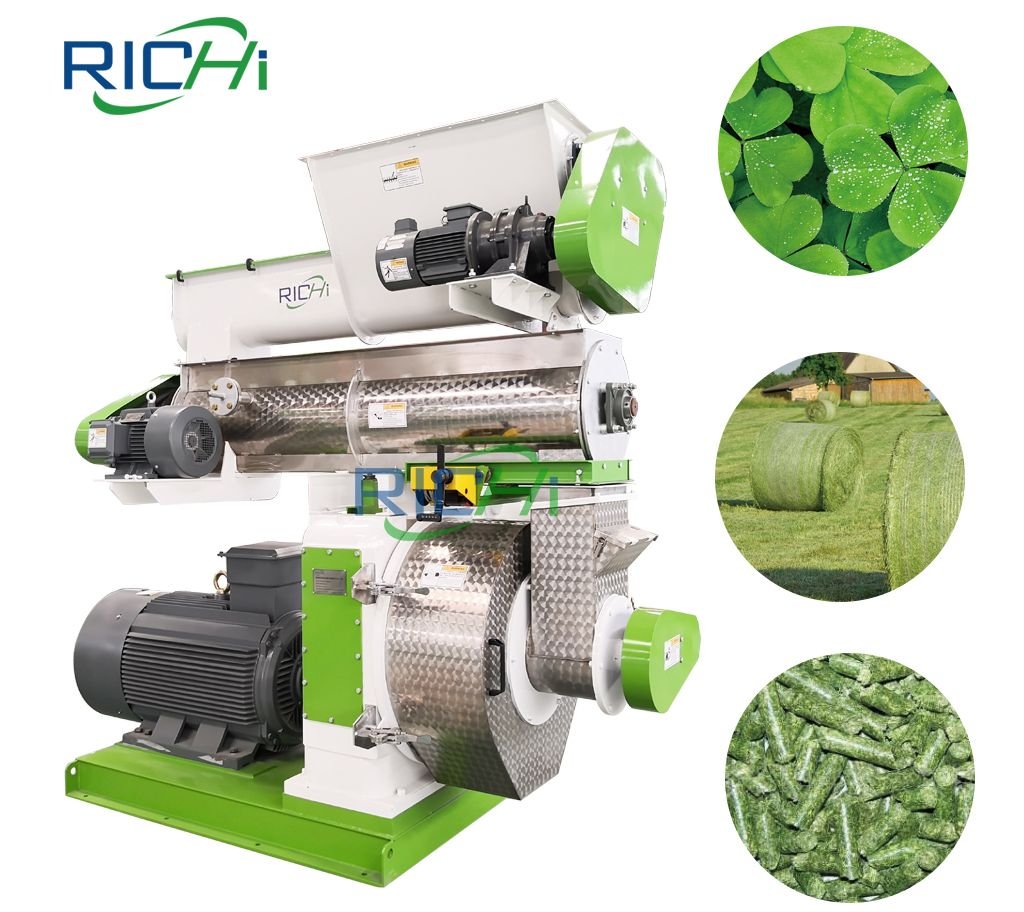When investing in an alfalfa pellet making machine, it is crucial to understand the various cost components involved to ensure a sound financial decision. Here’s a detailed breakdown of the primary cost factors:
1. Initial Purchase Price
- Cost Range: The initial cost of an alfalfa pellet making machine typically ranges from $10,000 to $100,000.
- Factors Influencing Price:
- Machine Capacity: Larger capacities (e.g., 0.6 to 10 tons per hour) generally cost more.
- Power Requirements: Machines with higher power needs (e.g., 37-280 kW) tend to be more expensive.
- Features: Additional features like automation, advanced controls, and integrated systems affect the price.
2. Raw Material Costs
- Harvesting: Costs associated with labor, fuel, and equipment maintenance for harvesting alfalfa.
- Drying: Alfalfa needs to be dried to a moisture content of about 15%, which may require additional equipment such as rotary dryers.
- Transportation: Costs for moving harvested alfalfa to the pellet mill, including fuel and labor, especially for long distances.
3. Energy Consumption
- Electricity Costs: Pellet machines consume significant power, ranging from 37 kW to 280 kW, which can lead to high electricity bills.
- Energy Efficiency: More energy-efficient machines may have higher initial costs but can lead to savings in the long run due to reduced energy consumption.
4. Labor Costs
- Operator Salaries: Skilled operators are required to manage the machine, handle maintenance, and ensure quality control.
- Training Costs: Initial and ongoing training for operators to ensure efficient and effective use of the machine.
5. Maintenance and Spare Parts
- Routine Maintenance: Regular inspections, lubrication, and minor repairs to keep the machine in good working condition.
- Spare Parts: Replacement parts such as dies, rollers, and bearings. The cost varies based on the machine’s make and model.
6. Depreciation
- Depreciation Rate: Typically, industrial machinery depreciates over 5-10 years based on usage and maintenance.
- Financial Impact: Depreciation affects financial statements and tax calculations, influencing the overall cost of ownership.
7. Auxiliary Equipment Costs
- Bale Breaker: Used for breaking down large bales of alfalfa into smaller, more manageable pieces.
- Crusher/Grinder: Reduces alfalfa particle size for uniform pelletization.
- Dryer: Ensures the alfalfa has the correct moisture content before pelletizing.
- Mixer: Blends alfalfa with other ingredients if producing mixed pellets.
- Cooler: Cools pellets after formation to prevent sticking and prepare them for storage.
- Packaging Machine: Automates the packaging of pellets into bags for storage and transport.
8. Installation and Setup Costs
- Site Preparation: Costs for preparing the installation site, including any necessary construction or modifications.
- Installation: Professional services to install the machine correctly and safely.
- Commissioning: Initial testing and calibration to ensure the machine operates efficiently and meets production goals.
9. Regulatory Compliance
- Environmental Regulations: Costs to ensure the machine meets emissions and other environmental standards.
- Safety Standards: Compliance with occupational health and safety regulations to ensure a safe working environment.
Related post: https://www.pellet-richi.com/wood-pellet-machine/alfalfa-pellet-production-line.html
Conclusion
Understanding the cost components of an alfalfa pellet making machine is essential for making an informed investment. The main costs include the initial purchase price, raw material costs, energy consumption, labor, maintenance, depreciation, auxiliary equipment, installation, and regulatory compliance. By carefully evaluating these factors, businesses can optimize their operations, reduce expenses, and enhance the overall return on investment.
Investors should consider both initial and ongoing costs to ensure the economic viability of their alfalfa pellet production. With advancements in technology, more efficient and cost-effective machines are becoming available, further improving the financial prospects of alfalfa pellet production.

